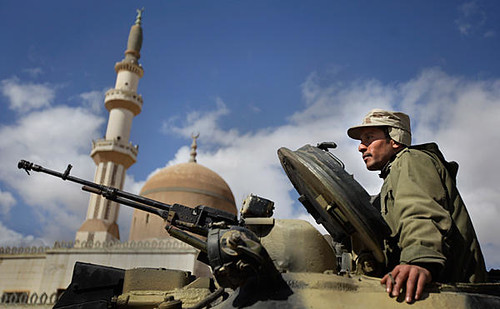
Libyan military forces on alert against CIA-backed counter-revolutionaries who are attempting to topple the government of Muammar Gaddafi. Government forces have routed the rebels from several key areas. a photo by Pan-African News Wire File Photos on Flickr.
AU security council backs Ouattara, Gaddafi
Friday, 11 March 2011 21:31
THE African Union Peace and Security Council has resolved to back Mr Alassane Ouattara in the Cote d'Ivoire political crisis and stand by Libyan leader Muammar Gaddafi in his clampdown on armed rebels in his country.
Meeting in Addis Ababa, Ethiopia, on Thursday night, the PSC said Mr Ouattara should preferably form an inclusive government with his rival, Mr Laurent Gbagbo.
President Mugabe joined other continental leaders who make up the 15-nation PSC.
The council met to receive recommendations by a five-country high-level panel it established to look into the Cote d'Ivoire issue.
It also then had deliberations on Libya and said the situation was now a civil war and should be treated as such.
Speaking at the Harare International Airport soon after returning from Addis Ababa yesterday, President Mugabe said continental leaders had agreed to stand by Mr Ouattara following contentious presidential elections late last year.
"The recommendation is that Ouattara should be sworn in (as president) . . . You are aware that the Gbagbo side still objects . . . but there was room left to incorporate Gbagbo," President Mugabe said.
Mr Gbagbo did not attend the meeting though Mr Ouattara did.
He reportedly said he could not leave Cote d'Ivoire as that could result in the internal situation further deteriorating.
The incumbent Ivorian leader has reportedly created a no-fly zone in a move observers say is calculated at ensuring Mr Ouattara cannot easily return home.
He sent former Prime Minister Pascal Affi N'Guessan, who chairs Mr Gbagbo's Ivorian Popular Front party, to represent him in Addis Ababa and rejected the PSC's resolution to back Mr Ouattara.
Mr N'Guessan told AFP: "The panel made a proposal we categorically reject.
"This proposal brought nothing to the table that we did not already know . . . If this initiative does not yield relevant and irrefutable proposals that are sufficiently convincing, we fear that the African Union will in a way contribute to completing the coup that began in 2002 and has evolved into an electoral coup with the latest presidential elections."
This was in reference to an attempted coup in 2002 that triggered a civil war.
The debate on Libya, where the situation has become dire since civilians got their hands on guns, occupied the PSC into the early hours of yesterday morning.
Libyan leader Gaddafi was not present, but sent a delegation that made what diplomatic sources called "a lacklustre presentation" to the PSC.
Despite that, the PSC recognised that the situation in Libya was ripe for undue Western interference and hence the need to back Gaddafi.
They emphasised that this was the opportune time to induce the Libyan strongman to institute political and policy reforms to allow greater freedom of expression in that country.
President Mugabe yesterday said, "We wanted to hear the truth about the situation.
"We took exception to interference by Western powers... and we absolutely reject their intervention.
"Africa will send a high-level panel of five Heads of State supported by experts (to Libya) to recommend the African position and what steps should be taken."
President Mugabe said the Libyan political system had been described as "authoritarian" and the AU should use the present state of affairs to prod Gaddafi into reforming.
However, this - the Zimbabwean leader said - was no excuse for the West to get involved without being asked to by the AU.
"Intrinsically, geographically, culturally, Libya is African... and African solutions are needed."
Diplomatic sources said President Mugabe and South Africa's President Jacob Zuma had agreed that Libya's internal politics were not desirable but allowing the kind of chaos that is prevailing to force a change of government would have dire repercussions for the rest of Africa.
AU chair, President Teodoro Obiang Nguema Mbasogo of Equatorial Guinea is understood to have said the matter was not about personal liking or disliking of Gaddafi.
"He said today it was Gaddafi and who knew where next such anarchy would erupt," a source said.
The PSC in January this year established a five-member panel to look into the Cote d'Ivoire issue and come up with recommendations that the AU can consider in terms of resolving the crisis.This was after the AU lost patience with mediator, Kenya's Prime Minister Raila Odinga, who at the 16th Ordinary Session of the continental bloc's General Assembly, un-procedurally tried to present to the media his report on Cote d'Ivoire.
AU Commission chair, Dr Jean Ping had to enlist security personnel to stop Mr Odinga.The PSC subsequently tasked the organ's chair, President Abdel Ould Aziz of Mauritania, to lead a panel that would come up with recommendations.
The other members of the panel were South Africa, Tanzania, Chad and Burkina Faso's.
The full PSC has three representatives from each of Africa's five regions with Zimbabwe, South Africa and Namibia representing Southern Africa.
1 comment:
In spite of the official condemnation of Western imperilist aggression against Libya,Us-led NATO continues to conduct very destructive military campaigns to overthrow the legitimate government of Libya
The Au is duty-bound to be more forceful in its total denunciation of this Neo- Colonial belligerency against our brotherly nation of Libya.Mr.E.haile from Eritrea.
Post a Comment